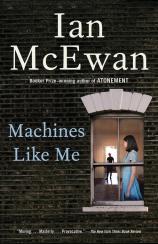Machines Like Me
Review
Machines Like Me
These are difficult times for England, as the nation struggles with the results of the Brexit referendum and the efforts to implement the decision of a divided electorate. One supposes it might be worse. In 1982, Britain and Argentina went to war over two tiny islands off the Argentine coast. The Falklands War was a 74-day conflict that began after Argentina asserted sovereignty over two small coastal islands. England responded with a naval invasion and recaptured the islands. Over 900 died in the invasion that ended in an Argentine surrender. The war helped to contribute to the legend of Margaret Thatcher and remains significant as the largest air-naval combat operation since World War II.
But what if the outcome had been different? MACHINES LIKE ME, Ian McEwan’s latest novel, speculates on how England might face the 21st century had the Falklands’ struggle turned out unsuccessfully. Early in the book, in a very brief narrative, the British naval invasion force is devastated by an Argentine missile attack. The badly beaten fleet returns to England, and the nation mourns. The Thatcher government struggles as the English economy stumbles. The course of history is changed. In Dickensian fashion, McEwan describes his fictional England: “Everything was rising --- hopes and despair, misery, boredom and opportunity. There was more of everything. It was a time of plenty.”
"Perhaps we should be grateful that doing good in the world and creating value in our lives continue to be achievements beyond the skills of robots."
All of this makes for background to other historical manipulations by McEwan. Most significant is that Alan Turing, the brilliant mathematician, does not commit suicide. Instead, he puts forward the theoretical principles that allow for the creation of human-like robots. In the opening pages of MACHINES LIKE ME, 12 male robots named Adam and 13 females named Eve go on sale the week before the Falklands Task Force leaves England. Charlie Friend, a young British day trader whose finances recently have been replenished with an inheritance as well as the sale of a family home, is one of the first purchasers of a robot. Charlie has selected his model after learning that Turing himself picked the same one.
As Adam arrives at Charlie’s small flat, he is unpacked, charged and programmed, joining his owner and Miranda, a young doctoral scholar who lives upstairs. Miranda is Charlie’s romantic interest, and her relationship with him, as well as with Adam, serves as one focal point of the novel. Soon after reaching full charge, Adam warns Charlie about Miranda’s past. The three-cornered relationship is complex as Adam takes upon himself multiple roles. His moral superiority stands out from that of both Charlie and Miranda, whose lives are filled with lies and human flaws.
From Isaac Asimov to “Star Trek” and “Westworld,”artificially created human life is a staple of fictional stories. It is a fertile field for authors because human and robot interaction creates complex moral relationships and tensions. Equally important is one of Asimov’s Three Laws of Robotics: “A robot may not injure a human being.” The violation of that rule is critical in MACHINES LIKE ME as it occurs both physically and psychologically.
On the pages of an Ian McEwan novel, moral difficulties often appear within simple everyday life. Confronting these issues, Adam reminds them that “the only solution to suffering would be the complete extinction of humankind.” Perhaps we should be grateful that doing good in the world and creating value in our lives continue to be achievements beyond the skills of robots.
Reviewed by Stuart Shiffman on April 26, 2019
Machines Like Me
- Publication Date: March 3, 2020
- Genres: Fiction
- Paperback: 352 pages
- Publisher: Anchor
- ISBN-10: 0525567038
- ISBN-13: 9780525567035










